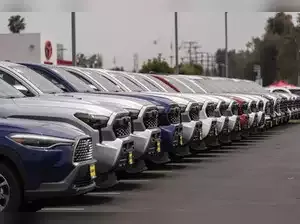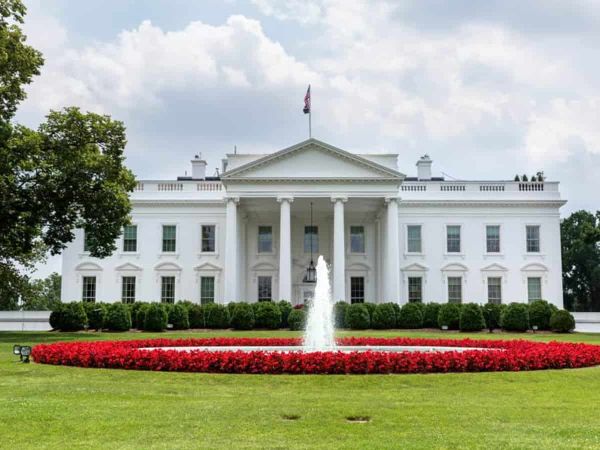US President Donald Trump has dismissed concerns that Americans should hasten car purchases ahead of new tariffs set to take effect in early April, asserting that the economy is set for significant growth despite rising vehicle prices and declining stock markets.
“I don’t think so,” he stated when asked if Americans should expedite their car-buying plans, as quoted in a report by USA Today.
“I think you’re going to have a country that’s going to boom.”
Under the new policy, a 25% tariff on imported cars and auto parts will come into force on April 2, with the additional fees being applied starting April 3.
Trump has also directed the implementation of reciprocal tariffs on all imports from nations that impose similar levies on U.S. goods.
Highlighting Hyundai’s recent $5.8 billion investment in a steel mill in Louisiana, Trump emphasized that the policy is already attracting significant industrial commitments.
However, financial markets reacted negatively to the impending tariffs. Wall Street saw losses across all three major stock indexes on Friday, marking a third consecutive session of declines.
Investors expressed concern over potential economic disruptions, while industry experts warned that increased costs could strain both the automobile sector and consumer spending.
German Finance Minister Joerg Kukies cautioned that the tariffs would have far-reaching effects beyond the U.S. market.
"Higher tariffs will hit German car manufacturers and the entire German economy particularly hard," Kukies remarked, as quoted in a report by USA Today.
"But they will also harm the U.S. economy, as they will make imports more expensive and increase prices for American consumers."
In response to the growing debate, Trump disclosed that he held discussions with Canadian Prime Minister Mark Carney regarding trade matters.
Expressing optimism, he noted, “We had a very good talk. I think things are going to work out very well between Canada and the United States.”
He further stated that he had engaged in talks with Senate Majority Leader John Thune and House Speaker Mike Johnson regarding potential legislative measures to provide tax relief to consumers.
“We’re going to do something that’s never been done in this country before,” Trump asserted, referring to a proposal to allow tax deductions on interest payments for auto loans on vehicles manufactured in the U.S.
While the president remains confident in his approach, industry stakeholders and global economic analysts continue to assess the broader impact of the tariffs on both domestic and international markets.
No Rush to Buy, Says Trump
Trump, speaking to reporters at the White House, rejected the idea that consumers need to accelerate automobile purchases before the tariff hike.“I don’t think so,” he stated when asked if Americans should expedite their car-buying plans, as quoted in a report by USA Today.
“I think you’re going to have a country that’s going to boom.”
Under the new policy, a 25% tariff on imported cars and auto parts will come into force on April 2, with the additional fees being applied starting April 3.
Trump has also directed the implementation of reciprocal tariffs on all imports from nations that impose similar levies on U.S. goods.
Economic Impact and Wall Street Reaction
Trump has projected that the tariffs will generate hundreds of billions of dollars for the U.S. Treasury while encouraging greater domestic manufacturing.Highlighting Hyundai’s recent $5.8 billion investment in a steel mill in Louisiana, Trump emphasized that the policy is already attracting significant industrial commitments.
However, financial markets reacted negatively to the impending tariffs. Wall Street saw losses across all three major stock indexes on Friday, marking a third consecutive session of declines.
Investors expressed concern over potential economic disruptions, while industry experts warned that increased costs could strain both the automobile sector and consumer spending.
Global Repercussions and Industry Concerns
International officials and car manufacturers have voiced apprehensions about the economic consequences of the tariff imposition.German Finance Minister Joerg Kukies cautioned that the tariffs would have far-reaching effects beyond the U.S. market.
"Higher tariffs will hit German car manufacturers and the entire German economy particularly hard," Kukies remarked, as quoted in a report by USA Today.
"But they will also harm the U.S. economy, as they will make imports more expensive and increase prices for American consumers."
In response to the growing debate, Trump disclosed that he held discussions with Canadian Prime Minister Mark Carney regarding trade matters.
Expressing optimism, he noted, “We had a very good talk. I think things are going to work out very well between Canada and the United States.”
Push for Domestic Investment and Tax Relief
Trump reiterated his belief that the tariffs would stimulate U.S. manufacturing by incentivizing companies to establish production facilities within the country.He further stated that he had engaged in talks with Senate Majority Leader John Thune and House Speaker Mike Johnson regarding potential legislative measures to provide tax relief to consumers.
“We’re going to do something that’s never been done in this country before,” Trump asserted, referring to a proposal to allow tax deductions on interest payments for auto loans on vehicles manufactured in the U.S.
While the president remains confident in his approach, industry stakeholders and global economic analysts continue to assess the broader impact of the tariffs on both domestic and international markets.
FAQs
What did Donald Trump say about buying cars before the new tariffs take effect?
Trump dismissed concerns that Americans should rush to purchase cars before the tariffs are implemented, asserting that the economy will continue to grow despite rising vehicle prices.When will the new auto tariffs take effect?
A 25% tariff on imported cars and auto parts will be enforced starting April 2, with additional fees applied from April 3.Disclaimer Statement: This content is authored by a 3rd party. The views expressed here are that of the respective authors/ entities and do not represent the views of Economic Times (ET). ET does not guarantee, vouch for or endorse any of its contents nor is responsible for them in any manner whatsoever. Please take all steps necessary to ascertain that any information and content provided is correct, updated, and verified. ET hereby disclaims any and all warranties, express or implied, relating to the report and any content therein.








